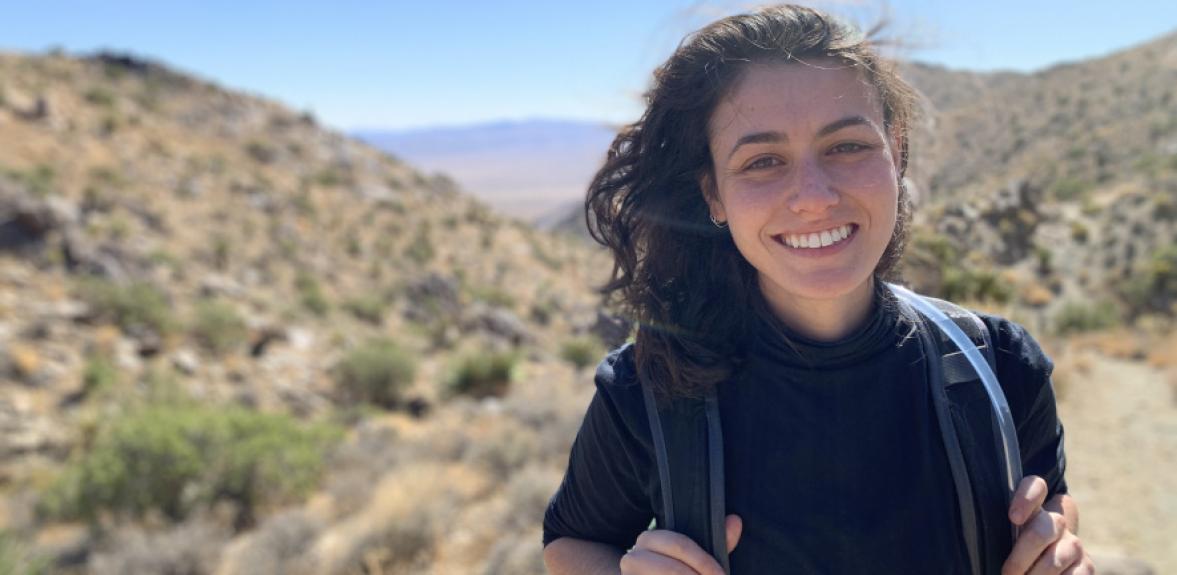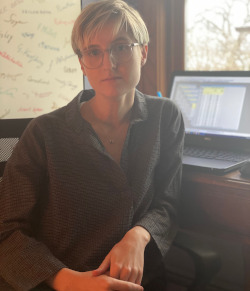
Gabi Heller: Schmidt Science Fellowship
Congratulations to Gabriella Heller, who has been awarded a Schmidt Science Fellowship for early-career scientists.
Gabi completed her MPhil and PhD here in the Centre for Misfolding Diseases and is currently a postdoc and Junior Research Fellow at Newnham College.
Schmidt Science Fellows are supported by Schmidt Futures, the philanthropic initiative of Google's former chairman Eric Schmidt and his wife Wendy, to pursue a postdoctoral research placement at a world-leading laboratory anywhere in the world. The placement must be in research at a significantly different discipline from their PhD, with the aim of exposing them to ideas and skills that will help them examine scientific problems and approaches from different perspectives.
So far Gabi’s research has focussed on using computational methods to probe how drugs interact with disordered proteins. “It was previously thought that all proteins adopt a well-defined three-dimensional structure, but now we understand some don’t,” explains Gabi. “These proteins are ‘floppy’ and we call them disordered proteins.
“I was working with Michele Vendruscolo and (the late) Chris Dobson, who are interested in the aggregation processes in Alzheimer’s and Parkinson’s diseases. Some of these disordered proteins form the plaques involved in this process, and I was looking for drugs that might keep them in the disordered state so they cannot aggregate,” she says.
One of the problems Gabi faced in her research was the difficulty of detecting drug-binding to these proteins experimentally, because they change so rapidly and offer no stable binding pockets. In fact, all the known binding mechanisms are believed to be impossible for potential drugs. The computational models use physical models of the proteins and drugs to find alternative binding models, and ultimately their success is based on the accuracy of the assumptions on which they rely.
So, as part of her Schmidt Fellowship, Gabi will shift her focus to developing new experimental methods to detect proteins, using NMR. In time, better experimental results could provide more accurate data for computational models. Gabi will be designing experiments for viral disordered proteins, which turns out to be a timely switch, given the current Covid-19 pandemic. She aims to work towards developing approaches for drug design that could offer entirely new paths for antiviral treatments.
One of the benefits of the programme is the opportunity to meet and network with the 21 other Fellows who are chosen annually from institutions across Europe, the USA and the UK.
Dr Kadi Liis Saar, who completed her PhD in the Knowles group, received a Schmidt Fellowship in 2019.
“A unique part of the Fellowship is the global meetings where all the Schmidt Science Fellows come together,” Kadi says. “The content of these meetings and the contacts that I made during them has been incredibly worthwhile. When I hear Schmidt Science Fellowship, the first thing I think about is our cohort – 20 scientists in different institutes and research fields, all of whom I have shared so many experiences with at the global meetings, and whom I know I can without hesitation contact whenever I need.”
Given the current lockdown, some meetings and the awards ceremony in New York have been unable to go ahead as planned. However, Gabi says, “They’ve done a fantastic job of moving a lot of the events that would have happened on-line, and we’ve been able to have breakout rooms and meet other Fellows individually. I even got to attend an on-line meeting where Schmidt Fellows who are working on aspects of Covid-19 described their work and were able to ask other Fellows for help with particular areas of expertise.”
“I was in touch with Gabi during the application process and I am so glad she was awarded the fellowship – it is such a fantastic opportunity,” says Kadi.
Ellen Purdy: Gates Scholarship

Congratulations to Ellen Purdy, who researched her MPhil here, and has now been awarded a Gates Scholarship to complete a PhD under Professor Stephen Elliott and Dr Michael Casford. Ellen writes: "As an undergraduate at the University of Chicago majoring in Chemistry, I identified art conservation as a field that brings together my love of scientific research and knowledge of art history."
Ellen will be working on the application of Raman Spectroscopy to non-destructive analysis of paint pigments. "The goal of this work is to further our understanding of the technical and aesthetic choices of artists as well as the effects of previous restoration work done on paintings," she says.
Ellen is a member of Lucy Cavendish College. She is currently at home in Minnesota, but is looking forward to returning to Cambridge when restrictions are lifted.
See our piece about Stephen Elliott's work in art conservation at the Fitzwilliam Museum in the Winter 2016 edition of Chem@Cam.
